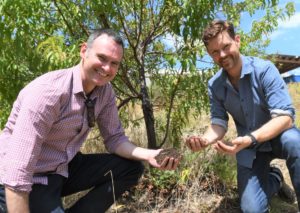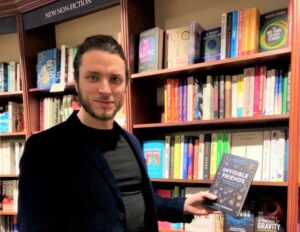
Humans are energised by dance music and now new Flinders University research has recorded rapid acceleration in soil fungi growth when sounds are played in a controlled environment.
With soil microbes contributing to plant growth and decomposition of nutrients in the soil, the discovery showcases the potential for ‘eco-acoustics’ as a new field in supporting native ecosystem restoration, fresh food production and composting industries.
“More than 75% of the world’s soils are degraded, so we need to take radical steps to reverse the trend and start restoring biodiversity,” says Dr Jake Robinson, a microbial ecologist at Flinders University.
“This research surprised us when one common plant growth-promoting fungi increased its initial number of spore cells biomass by almost five times compared to the control group where soundwaves were at ambient levels.
“Our study also highlights the importance of soundscapes in nature. We can now listen to the sounds that tiny animals as an indicator of soil health, but we might also be able to apply sound to improve soil health.”
The novel study involved burying regular teabags in soundproof boxes to enable the growth of biomass as the organic matter degraded. Some were exposed to ‘loud’ high-pitched monotone soundwaves about 80 decibels at 8 kHz frequency for up to eight hours a day for 14 days. Teabags in the control sample produced less fungi growth when exposed to only 30 decibels of noise.
Total fungal biomass growth in each the high soundwave teabags gained about 0.5g grams compared to little change in the control zone.

The beneficials Trichoderma harzianum conidia (spore) activity increased about fivefold compared to the control samples when exposed to soundwaves in Petri dishes for only five days.
The United Nations Decade on Ecosystem Restoration (2021-2030) focuses on preventing, halting and reversing the loss of nature – for climate, nature and people.
Co-author Flinders University Associate Professor Martin Breed says: “Our lab’s studies into restoration ecology are paving the way for improved native vegetation regrowth – including the reintroduction of lost species.
“Our research into the potential of stimulating soil microbial activity harnesses other innovative possibilities to help restore nature,” says Associate Professor Breed, who researches ecosystem and the associated effects on human health with fellow Flinders University researchers.
After revegetation, it can take decades for soil microbes to fully recover so the potential to speed up the process is an exciting development.
Christian Cando-Dumancela, another co-author of the study, adds: “It might be that microbes, including fungi, can convert the soundwave energy into an electrical charge, which stimulates their activity. Our study lays the foundations for some exciting future research.”
Researchers say a piezoelectric effect and/or fungal mechanoreceptor stimulation are the possible mechanisms involved.

“Our study highlights the potential of acoustic stimulation to alter important functional soil components, which could, with further development, be harnessed to aid ecosystem restoration,” they conclude.
The pre-print article, Sonic restoration: Acoustic stimulation enhances soil fungal biomass and activity of plant growth-promoting fungi (2024) by Jake M Robinson, Christian Cando-Dumancela and Martin F Breed is being peer reviewed ahead of publication. The preview is available on the preprint server for biology bioRxiv doi: https://doi.org/10.1101/2024.01.11.575298
See also Opportunities and challenges for microbiomics in ecosystem restoration (2023) in Trends in Ecology and Evolution. DOI: 10.1016/j.tree.2023.07.009, and Biodiversity and human health: A scoping review and examples of underrepresented linkages (2024) in Environmental Research. DOI: 10.1016/j.envres.2024.118115.
Also Agricultural land-use legacies affect soil bacterial communities following restoration in a global biodiversity hotspot (2024) by Shawn D Peddle, Christian Cando-Dumancela, Siegfried L Krauss, Craig Liddicoat, Angela Sanders and Martin F Breed published in Biological Conservation DOI: 10.1016/j.biocon.2023.110437 and Probiotic Cities: microbiome-integrated design for healthy urban ecosystems (2024) by Jake Robinson, Martin F Breed and Richard Beckett (University College London), just published in Trends in Biotechnology

